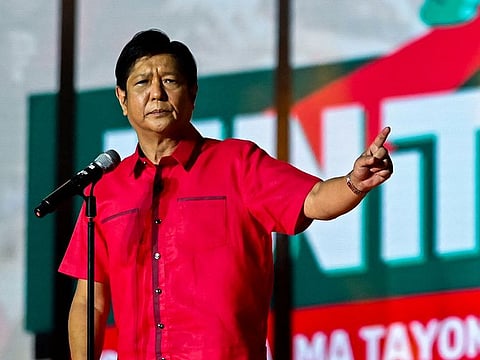A change in the Philippines
Marcos Jr will likely take over from Rodrigo Duterte

Six years ago, Rodrigo Duterte became president of the Philippines, riding a populist wave that swept the popular straight-talking mayor of Davao to the highest office in the archipelago nation of more than 110 million. It has not been a presidency without controversy, but its ending begins on Monday with a new presidential election.
Approximately 67 million citizens are entitled to vote in the elections that will also decide the vice presidency, 12 senate seats, 300 lower house seats, and roughly 18,000 local positions, from city mayors and provincial governors to local council seats across a country of 7,000 islands.
Heading into these critical elections — the nation faces an economy struggling to shake off the effects of the hibernation brought about by the coronavirus pandemic — the reality is that of the many candidates standing to replace Duterte, only two have a realistic chance of winning.
Ferdinand Marcos Jr., the son of the former long-time Philippine leader, has a massive lead in the polls and is currently polling at 56 per cent. The next highest candidate is former vice president Leni Robredo, with opinion polls suggesting that one voter in four is backing him.
In the Philippines’ one-round system, a candidate does not even need to win a majority to be elected president – giving Marcos Jr, commonly known as “Bongbong”, an even higher likelihood of electoral success when the votes are tallied up.
Marcos’ father was overthrown in a 1986 “People Power” uprising. Now, people power will likely lead him to the presidential palace on a promise of stability and unity. For critics and opponents, his popularity belies his family’s controversial past. His father ruled from the 1970s and imposed martial law — an issue that most voters seem to be willing to overlook by his campaign for unity.
As under Duterte, the choice of president will not be uncontroversial nor indivisive.
The other main contenders are Vice President Leni Robredo, Manila mayor Francisco “Isko Moreno” Domagoso, retired boxing icon Manny Pacquiao and Panfilo Lacson, a former police chief.
More than 1.7 million Filipinos living overseas are entitled to cast ballots. Their remittances from the UAE and other Gulf nations are an important factor in sustaining families and the economy at a time when the pandemic has stymied domestic growth.
What tentative growth had begun after the pandemic was reset by the advent of the Omicron variant that plunged the nation back into chaos as a new set of lockdown restrictions were enforced.



